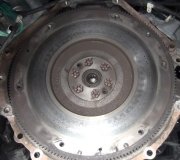Saturday, October 20th, 2012 AT 8:36 AM
Hello good evening. I was wondering if anyone could help me please, I recently finished rebuilding my first engine, im a student. I rebuilt a ford 351 new pistons, new rings, new main, cam and rod bearings. The engine was working great the seconds I had it on without water. As I was adding water, water started to leak from the temperature sensor on the intake, the water went directly towards the distributor hole which im sure alot of water got inside the engine and some water drained inside the hole of the timming cover where the oildipstick goes. I drained the oil when I saw that and changed the oil for new but now the engine is hard to crank, and when it turns on I can hear sometimes a hard knocking on the block, what should I do? Is it because the bearings got wet? Am I going to have to open the engine again Id apreciate so much if you could help me please thank you


